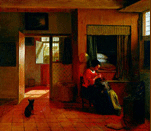










38.
Teaching about Marriage & Churching
Ceremonies in Early Modern England
Organizers:
Description:
In this workshop we will confront the pedagogical and intellectual issues
involved in teaching today's students (and ourselves as well) about the Marriage
and Churching rituals of the Church of England in the sixteenth and seventeenth
centuries. This workshop is particularly interdisciplinary in its weaving
together of the varied theological, social and cultural considerations, which
all reflect on and are inflected in these two rituals. Furthermore, it will
draw on a common ground of literary texts to establish a wider context for
the playing out of these rituals in Early Modern England.
The discussion of these considerations will be fostered by
first looking closely at the primary biblical and theological texts (included
in the Preliminary List of Readings), which define the Marriage and Churching
rituals of the Church of England. Thus we as organizers will use the first
twenty minutes of the workshop to establish the background and foundation
for the study and teaching of literary texts. This will be accomplished by
closely reading the biblical texts about marriage and ritual cleanliness (related
to churching), and considering the Church's interpretation of these texts
(as presented by Hooker and Milton). The three organizers of this workshop
bring complementary approaches to bear on the study of these rituals, through
attention to: the tradition of Christian Hebraism which underlies the Church's
concern with the biblical text; the theological issues which were of concern
to the Church of England, and which are reflected as well in literary works
of the Early Modern Period; and issues of gender, which define the varied
expressions of women's subjectivity in both religious and social settings.
As moderators of this workshop, we will then open the discussion to all the
participants, particularly underlining the larger cultural issues involved
in constructions of feminine identity in marriage and childbirth. The discussion
of these issues will draw upon the shared literary and pedagogical ground
of this workshop's organizers and participants, as represented in the "Source
Texts" of the "List of Suggested Readings." Thus we will first
turn to Spenser's famous and pioneering "Epithalamion." Shakespeare's
plays will then bring to the fore interesting questions and problems regarding
women's role and female identity in terms of marriage and the social contract.
Finally, Cary's play provides an important counterpoint to those by Shakespeare,
as it interrogates the wife's obligations to her husband in marriage, and
does so from a startlingly modern point of view.
It is important to focus in this workshop on the ways in which we can uncover for our students the tensions that were inherent between the institutional ideals and the cultural practice, as for example in women's appropriation of the Churching ceremony. In other words, we would like to consider the ways in which the cultural practice takes on a life of its own beyond the institutional norms (and in this case) the theological ideals. The critical essays included in the "List of Suggested Readings" offer the workshop participants further discussions of the various cultural aspects of Marriage and Churching rituals, which throw light on the biblical, theological and literary texts foregrounded in this workshop.
Preliminary Readings:
Cary, Elizabeth
The Tragedy of Mariam
Shakespeare, William
A Midsummer Night's Dream
Measure for Measure
The Winter's Tale
Spenser, Edmund.
Epithalamion
Critical Essays:
A. Churching
Coster, William. "Purity, Profanity, and Puritanism: The Churching of Women, 1500-1700." In Women in the Church. Ed. W.J. Sheils and Diana Wood. Oxford: Basil Blackwell, 1990. 377-387.
Cressey, David. "Purification, Thanksgiving and the Churching of Women in Post-Reformation England." Past and Present 141 (1993): 106-146.
Johnson, Jeffrey. "The Churching of Women." In The Theology of John Donne. Rochester, N.Y.: Boydell & Brewer, 1999. 98-105.
Wilson, Adrian. "The Ceremony of Childbirth and its Interpretation." In Women as Mothers in Pre-Industrial England. London: Routledge, 1990. 68-107.
|
|
|
||||||
|
|
 |
 |
|
||||
 |
|
 |
|
||||
|
|
|
||||||
|
|
|
||||||
 |
|
||||||
|
|
|
||||||
| |
|
||||||
 |
|
||||||
 |
|
||||||
 |
|
||||||
 |
|
||||||
|
|
|
||||||
|
|
 |
|
|
||||
 |
|
||||||
|
|
|
|
|
|
|
|
|